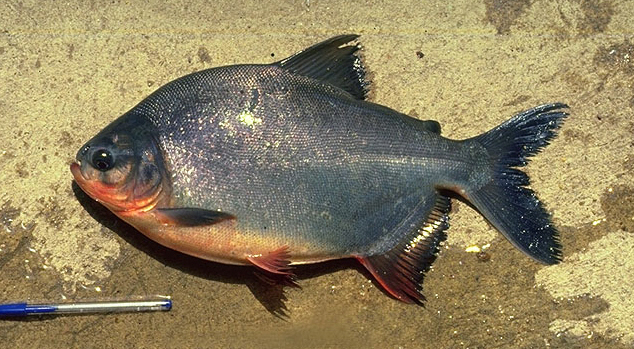Swedish men told to beware testicle-munching fish
Experts have warned Swedish men to keep their swimming trunks on if taking a dip in a sound off the country's southern coast, after a South American fish known for attacking testicles was discovered in the area.
Swedish men told to beware testicle-munching fish. Pacu
A pacu fish is a relative of the piranha and is most commonly found in the Amazon region.
By Hannah Strange
12:16PM BST 10 Aug 2013
The alert came after a fisherman in the Oresund Sound last week retrieved a 21 centimetre pacu - a relative of the piranha that is most commonly found in the Amazon region.
"Keep your swimwear on if you're bathing in the Sound these days - maybe there are more out there!" cautioned the National History Museum in neighbouring Denmark.
The freshwater fish, which can grow up to 90 centimetres and weigh up to 25 kilogrammes, has been nicknamed the "ball cutter" for its attacks on the male genitalia.
In areas where pacus proliferate, fishermen have reportedly bled to death after losing their testicles to the fish's crushing jaws.
Found in most rivers in the Amazon and Orinoco basins in South America, they have also been spotted in Papua New Guinea, where it is believed they have been introduced to boost fish stocks. Discoveries have also been reported in several US states; in 2006, officials at one Texas lake reportedly put a $100 bounty on the pacu caught there.
But this is the first time a pacu has been caught at sea in Europe, the museum said.
"The pacu is not normally dangerous to people but it has quite a serious bite, there have been incidents in other countries, such as Papua New Guinea where some men have had their testicles bitten off," Henrik Carl, a fish expert at the Danish museum, said.
"They bite because they're hungry, and testicles sit nicely in their mouth," he told The Local.
"And its mouth is not so big, so of course it normally eats nuts, fruit, and small fish, but human testicles are just a natural target. It's not normal to get your testicles bitten off, of course, but it can happen, especially now in Sweden."
The pacu was similar in appearance to its notorious cousin, the piranha, he said.
"They are almost identical to the piranha, you couldn't even tell from the outside. It's just that they have different teeth. Flatter and stronger, perfect for crushing," he added.
Mr Carl said that the discovery of one pacu - which is currently undergoing DNA tests to confirm its identity - should not keep Swedish men out of the water. But if more were found in the area, it could become a serious issue, he suggested.
"This one was the first, but who knows, it's probably not the last."

Experts have warned Swedish men to keep their swimming trunks on if taking a dip in a sound off the country's southern coast, after a South American fish known for attacking testicles was discovered in the area.
Swedish men told to beware testicle-munching fish. Pacu
A pacu fish is a relative of the piranha and is most commonly found in the Amazon region.
By Hannah Strange
12:16PM BST 10 Aug 2013
The alert came after a fisherman in the Oresund Sound last week retrieved a 21 centimetre pacu - a relative of the piranha that is most commonly found in the Amazon region.
"Keep your swimwear on if you're bathing in the Sound these days - maybe there are more out there!" cautioned the National History Museum in neighbouring Denmark.
The freshwater fish, which can grow up to 90 centimetres and weigh up to 25 kilogrammes, has been nicknamed the "ball cutter" for its attacks on the male genitalia.
In areas where pacus proliferate, fishermen have reportedly bled to death after losing their testicles to the fish's crushing jaws.
Found in most rivers in the Amazon and Orinoco basins in South America, they have also been spotted in Papua New Guinea, where it is believed they have been introduced to boost fish stocks. Discoveries have also been reported in several US states; in 2006, officials at one Texas lake reportedly put a $100 bounty on the pacu caught there.
But this is the first time a pacu has been caught at sea in Europe, the museum said.
"The pacu is not normally dangerous to people but it has quite a serious bite, there have been incidents in other countries, such as Papua New Guinea where some men have had their testicles bitten off," Henrik Carl, a fish expert at the Danish museum, said.
"They bite because they're hungry, and testicles sit nicely in their mouth," he told The Local.
"And its mouth is not so big, so of course it normally eats nuts, fruit, and small fish, but human testicles are just a natural target. It's not normal to get your testicles bitten off, of course, but it can happen, especially now in Sweden."
The pacu was similar in appearance to its notorious cousin, the piranha, he said.
"They are almost identical to the piranha, you couldn't even tell from the outside. It's just that they have different teeth. Flatter and stronger, perfect for crushing," he added.
Mr Carl said that the discovery of one pacu - which is currently undergoing DNA tests to confirm its identity - should not keep Swedish men out of the water. But if more were found in the area, it could become a serious issue, he suggested.
"This one was the first, but who knows, it's probably not the last."






Comment